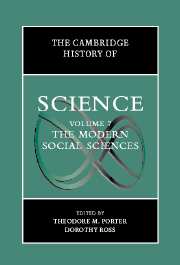Book contents
- Frontmatter
- 1 Introduction: Writing the History of Social Science
- PART I SCIENCES OF THE SOCIAL TO THE LATE NINETEENTH CENTURY
- PART II THE DISCIPLINES IN WESTERN EUROPE AND NORTH AMERICA SINCE ABOUT 1880
- 13 Changing Contours of The Social Science Disciplines
- 14 Statistics and Statistical Methods
- 15 Psychology
- 16 Economics
- 17 Political Science
- 18 Sociology
- 19 Anthropology
- 20 Geography
- 21 History and the Social Sciences
- PART III THE INTERNATIONALIZATION OF THE SOCIAL SCIENCES
- PART IV SOCIAL SCIENCE AS DISCOURSE AND PRACTICE IN PUBLIC AND PRIVATE LIFE
- Index
- References
19 - Anthropology
from PART II - THE DISCIPLINES IN WESTERN EUROPE AND NORTH AMERICA SINCE ABOUT 1880
Published online by Cambridge University Press: 28 March 2008
- Frontmatter
- 1 Introduction: Writing the History of Social Science
- PART I SCIENCES OF THE SOCIAL TO THE LATE NINETEENTH CENTURY
- PART II THE DISCIPLINES IN WESTERN EUROPE AND NORTH AMERICA SINCE ABOUT 1880
- 13 Changing Contours of The Social Science Disciplines
- 14 Statistics and Statistical Methods
- 15 Psychology
- 16 Economics
- 17 Political Science
- 18 Sociology
- 19 Anthropology
- 20 Geography
- 21 History and the Social Sciences
- PART III THE INTERNATIONALIZATION OF THE SOCIAL SCIENCES
- PART IV SOCIAL SCIENCE AS DISCOURSE AND PRACTICE IN PUBLIC AND PRIVATE LIFE
- Index
- References
Summary
Cultural anthropology, social anthropology, ethnology, Volkskunde and Völkerkunde, anthropology tout court: It would be foolhardy to attempt a common definition for these terms, let alone to specify a shared program for what appears to be rather a series of loosely connected, geographically variable, and historically unstable projects. Indeed, a coherent history of the varieties of world anthropology is not a plausible enterprise.
My strategy here is to concentrate on the development of what came to be known in the early twentieth century as social anthropology (the usual term in Europe), or cultural anthropology (the American designation), the dominant traditions throughout this period. Second, I will identify common elements in the trajectories of these traditions, although much of the argument will necessarily concern various national schools. In tracing the modern history of this discourse, I have adopted the conventional, though certainly debatable, division into three stages: the evolutionist debates and the confrontations between evolutionists and diffusionists, roughly, 1860–1920; the social science or behaviorist phase, running from about 1920 to 1970, when the theoretical models were drawn from sociology and psychology or from structural linguistics; and the more recent period, during which the dominant project has been what Clifford Geertz termed “the interpretation of cultures” and the most potent theoretical influences have come from philosophy, semiotics, and literary theory. To be sure, some national schools developed along very different lines; and while this periodization is most apparent in the development of cultural anthropology in the United States, even there, all three orientations — roughly, evolutionist, functionalist or structuralist, and interpretivist — coexisted uneasily throughout the twentieth century.
- Type
- Chapter
- Information
- The Cambridge History of Science , pp. 354 - 378Publisher: Cambridge University PressPrint publication year: 2003
References
- 3
- Cited by

